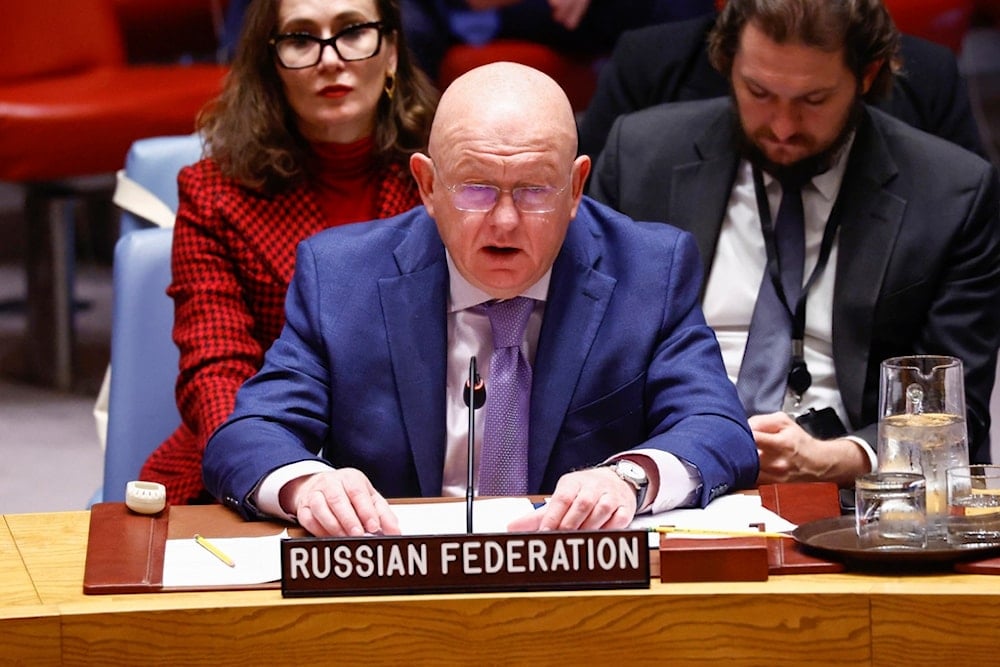Russia vetoes UK-backed UNSC resolution for Sudan
Russia's representative says that the proposal infringes on the sovereignty of the Sudanese government.
-

Vasily Nebenzya, Permanent Representative of Russia to the UN, speaks during a United Nations Security Council meeting on the situation in the Middle East, including the Palestinian question at UN headquarters, on October 29, 2024. (AP)
The Russian Federation vetoed a controversial resolution backed by the United Kingdom on Sudan, in a meeting of the United Nations Security Council.
The draft, submitted by Sierra Leone and the United Kingdom, garnered support from 14 members but was vetoed by Moscow.
Both the United States and the United Kingdom blasted Russia for vetoing the resolution, as the former claimed that Moscow went against the Sudanese government's will.
"It is shocking that Russia has vetoed an effort to save lives – though perhaps, it shouldn’t be. They claim it is because of Sudanese sovereignty. But Sudan supports the resolution," US Representative to the United Nations, Ambassador Linda Thomas-Greenfield claimed during the meeting.
However, soon after the Sudanese Foreign Ministry released a statement, quoted by Reuters, which commended the Russian veto.
"The government of Sudan commends the Russian position, which came as an expression of ... respect for the sovereignty of states and international law, and support for the independence and unity of Sudan and its national institutions," the ministry stressed.
Read more: Sudan's Al-Burhan boycotts Geneva talks, says will 'fight 100 years'
So why did Russia veto the resolution?
Russia argued that the resolution, which aims to impose a ceasefire on all sides in Sudan and facilitate humanitarian aid, infringes on Sudan's sovereignty.
According to watchdogs, the final draft of the resolution contained references to "parties to the conflict," equating between the Rapid Support Forces (RSF) on one end and the Sudanese Armed Forces and authorities on the other. These references were made in relation to the facilitation of humanitarian aid assistance, cessation of hostilities, adherence to International Humanitarian Law, avoiding attacks on civilians, and preventing incidents of conflict-related sexual violence.
Several other issues relating to the language used in the resolution were brought up in the drafting process ahead of the vote. However, China's representative noted, following the vote, that UNSC members' constructive proposals were not taken on board and their legitimate concerns were not given sufficient attention.
China also stressed that any resolution or action taken by the council must "respect the sovereignty, independence, and territorial integrity of Sudan."
"Imposing external solutions will only further complicate the situation and will not help bring an end to the war nor serve the goal of protecting civilians," China's representative warned.
In his explanation of the vote, Russia's representative said "The main problem with the UK draft is that it has a false understanding of who bears responsibility for the protection of civilians, and border control and security control in the country."
This, the Russian representative said, "should solely be the Government of Sudan."
He also accused UK diplomats of "clearly refusing Sudan that right."
"Our country will continue unfailingly to use its veto to prevent such events from happening for our African brothers," he concluded.
Read more: Egypt's el-Sisi assures Sudan army chief of 'continued support'
UK fails to garner support of A3-plus for resolution's contents
During the drafting process, the UK invited Algeria, Mozambique, Sierra Leone, and Guyana to co-author the resolution. However, the group of nations could not agree on key issues and Sierra Leone was the only nation to join the UK.
Following the vote, Algeria's delegate called for "the strong and public condemnation of foreign interferences in Sudan," urging respect for the established stations regime and the arms embargo by all Member States.
"The Council’s response must be guided by full respect for Sudan’s sovereignty, independence and territorial integrity," he emphasized.
Read more: UAE hides weapons behind aid to fuel conflict in Sudan: NYT

 4 Min Read
4 Min Read








